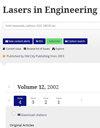基于sio2 / al2o3陶瓷的CO 2、Nd:YAG、准分子和高功率二极管激光器光束相互作用特性的差异
IF 0.5
4区 工程技术
Q4 MATERIALS SCIENCE, MULTIDISCIPLINARY
引用次数: 8
摘要
采用多种技术和方法研究了CO 2激光器、Nd:YAG激光器、高功率二极管激光器(HPDL)和带有sio2 / al2o3陶瓷的准分子激光器的光束相互作用特性的差异。利用Beer-Lambert定律的导数,计算出4种激光器的光束吸收长度分别为:co2激光器470 ~ 22µm, Nd:YAG激光器195 ~ 12µm, HPDL激光器177 ~ 15µm,准分子激光器7.5 ~ 19µm。CO 2激光、Nd:YAG激光、HPDL激光和准分子激光的能量阈值分别为68、128、181和0.12 J cm m2。吸收率测量结果表明,sio2 / al2o3陶瓷的实际吸收率与四种激光器的吸收长度之间没有相关性。co2激光器、Nd:YAG激光器、HPDL激光器和准分子激光器的热载荷值分别为2.57、6.73、9.83和22.24 kJ。本文章由计算机程序翻译,如有差异,请以英文原文为准。
On the differences between the beam interaction characteristics of CO 2, Nd:YAG, excimer and high power diode lasers with a SiO 2/Al 2O 3 ceramic
By using a number of techniques and approaches certain differences between the beam interaction characteristics of CO 2 laser, a Nd:YAG laser, a high power diode laser (HPDL) and an excimer laser with a SiO 2 /Al 2 O 3 ceramic have been investigated. By employing a derivative of Beer-Lambert's law, the laser beam absorption lengths of the four lasers were calculated as 470 - 22 µm for the CO 2 laser, 195 - 12 µm for the Nd:YAG laser, 177 - 15 µm for the HPDL and 7.5 - 19 µm for the excimer laser. The fluence threshold values at which significant material removal occurs the CO 2 laser, Nd:YAG laser, HPDL and excimer laser were found to be 68, 128, 181 and 0.12 J cm m 2 , respectively. Absorptivity measurements revealed that there is no correlation between the actual absorptivity of the SiO 2 /Al 2 O 3 ceramic and the absorption length for each of the four lasers. The thermal loading values for the CO 2 laser, the, Nd:YAG laser, the HPDL and the excimer laser were determined as 2.57, 6.73, 9.83 and 22.24 kJ...
求助全文
通过发布文献求助,成功后即可免费获取论文全文。
去求助
来源期刊

Lasers in Engineering
工程技术-材料科学:综合
CiteScore
1.00
自引率
20.00%
发文量
0
审稿时长
3.4 months
期刊介绍:
Lasers in Engineering publishes original (primary) research articles, reviews, short communications and letters on all aspects relating to the application of lasers in the many different branches of engineering and related disciplines.
The topics covered by Lasers in Engineering are the use of lasers: in sensors or measuring and for mapping devices; in electrocomponent fabrication; for materials processing; as integral parts of production assemblies; within the fields of biotechnology and bioengineering; in micro- and nanofabrication; as well as the materials and processing aspects of techniques such as cutting, drilling, marking, cladding, additive manufacturing (AM), alloying, welding and surface treatment and engineering.
Lasers in Engineering presents a balanced account of future developments, fundamental aspects and industrial innovations driven by the deployment of lasers. Modern technology has a vitally important role to play in meeting the increasingly stringent demands made on material and production systems. Lasers in Engineering provides a readily accessible medium for the rapid reporting of new knowledge, and technological and scientific advances in these areas.
 求助内容:
求助内容: 应助结果提醒方式:
应助结果提醒方式:


